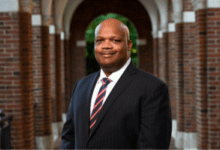
Dr. Jennifer Brown has been appointed Vice President of Academic Affairs and Provost of Cal Poly Pomona effective April 1. In that role, she will be the university’s chief academic officer, with responsibility for the institution’s academic programs, resources and planning. The deans of the eight academic colleges report to the provost as do the units tasked with promoting student success and faculty research.
Brown is currently the vice provost and dean for Undergraduate Education at the University of California Riverside, where she leads institutional student success efforts for that university’s more than 20,000 undergraduate students. She is also a professor in the School of Public Policy.
In announcing her appointment, Cal Poly Pomona University President Soraya M. Coley noted Brown’s commitment to student, faculty and staff success; record of leading innovations in digital teaching and learning; focus on access, equity and inclusive excellence; and her breadth of experience in interdisciplinary research and scholarship.
Prior to joining UCR in 2018, Brown served as Vice Provost and Dean (2016-2018) and Associate Dean (2015-2016) of the Graduate School at Oregon State University (OSU).
She began her faculty career at Purdue University in 2004, where she held a joint appointment in the departments of Horticulture and Landscape Architecture, and Agricultural Economics. She also served as the inaugural Director of Distance Education. Her applied research program in sustainability and the specialty crop industry has been recognized nationally, resulting in her appointment to the National Agriculture Statistics Service Advisory Committee.
Brown earned her Ph.D. in horticulture with an emphasis in marketing and consumer behavior from Michigan State University (2004). She also holds both an M.S. in natural resources and environmental sciences (2001) and a B.S. in ornamental horticulture (1999) from the University of Illinois at Urbana-Champaign.
Cal Poly Pomona, formally known as California State Polytechnic University, Pomona, has approximately 29,000 students. The university is known for its hands-on teaching philosophy and is nationally recognized as a leader in providing students the skills necessary for socio-economic mobility.
The post Dr. Jennifer Brown: Cal Poly Appoints VP and Provost appeared first on Precinct Reporter Group News.










